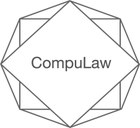Projects

COMPULAW
Governance of Computational Entities through an Integrated Legal and Technical Framework
The H2020 ERC Advanced Grant proposal 'Computable Law', or CompuLaw, coordinated by Prof. Giovanni Sartor, was selected for funding by the European Research Council in the 2019. Motivation for CompuLaw lies in the need for the law to govern intelligent computational entities, and the human-artificial social ecology in which they participate. These entities are so many, so fast, and so ubiquitous that it is impossible for humans to monitor them and anticipate illegal behaviour. The solution envisaged by Compulaw is to make law computation-oriented. That is, to integrate, map and partially translate legal and ethical requirements into computable representations of legal knowledge and reasoning. The European University Institute (EUI) and the University of Bologna provide the main expertise for the five-year multi-disciplinary project.

CROSSJUSTICE
Knowledge, Advisory and Capacity Building Information Tool for Criminal Procedural Rights in Judicial Cooperation
CrossJustice aims to tackle the issues arising from linguistic barriers and peculiarities of different national legal system in the context of criminal procedural rights. It does so by developing an online platform for advice and support on the effectiveness of procedural rights providing a free service, mainly directed to legal professionals, but accessible to law students, NGOs and all EU citizens. The platform provides and innovative architecture with the aim of providing support with regard to: 1) the compliance of national instruments implementing EU directives with the EU acquis. 2) the compatibility between national frameworks as resulting from the implementation of EU directives. Thanks to this set of resources and functionalities, the CrossJustice platform will contribute to meet all needs above indicated, in the domain of criminal procedure rights. In particular, it will contribute to provide an ICT-supported analysis and assessment over the compliance of national legislation with EU acquis on the matter, and to support capacity building of legal professionals, by enabling lawyers and students to complement their knowledge of the national implementation of the EU acquis on procedural rights

INTERLEX
Decision Support and Training on Internet-related Private International Law
InterLex was an EU funded project (2017-2019) aimed at developing an online platform to provide information, decision support and training on private international law. It addressed the identification of the legal system having jurisdiction and of the national law to be applied to a specific case as well as the retrieval of relevant legal materials. The InterLex online platform delivers 1) free access to a large collection of European, international and national legal instruments and case law in the area of private international law as well as expert materials; 2) decision support service directed to legal professionals, but also freely accessible to law students and citizens, and 3) a set of training tools on private international law for legal professionals and law students.

CLAUDETTE
Machine Learning Powered Analysis of Consumer Contracts and Privacy Policies
Claudette is an interdisciplinary research project hosted at the Law Department of the European University Institute, led by professors Giovanni Sartor and Hans-W. Micklitz, in cooperation with engineers from University of Bologna and University of Modena and Reggio Emilia. The research objective is to test to what extent is it possible to automate reading and legal assessment of online consumer contracts and privacy policies, to evaluate their compliance with EU’s unfair contractual terms law and personal data protection law (GDPR), using machine learning and grammar-based approaches. The idea arose out of bewilderment. Having read dozens of terms of service and of privacy policies of online platforms, we came to conclusion that despite substantive law in place, and despite enforcers’ competence for abstract control, providers of online services still tend to use unfair and unlawful clauses in these documents. Hence, the idea to automate parts of enforcement process by delegating certain tasks to machines. On one hand, we believe that relying on automation can increase quality and effectiveness of legal work of enforcers. On the other, we want to empower consumers themselves, by giving them tools to quickly assess whether what they agree to online is fair and/or lawful.

ADELE
Analytics for DEcision of LEgal cases
Project ADELE is premised on the ongoing paradigm shift towards AI and cognitive computing which is transforming many socio-economic activities, including justice. The project applies legal analytics (LA) – a blend of data science, machine learning and natural language processing techniques – to judicial decisions. It aims to develop methods to extract knowledge and engage in judicial outcome predictions, and therefrom build a pilot tool to support legal research and decision-making processes in the judiciary. The project will begin with the analysis of four datasets of judgments respectively of Italian and Bulgarian case law in the fields of Intellectual Property, and Unfair Commercial Practices.

LAILA
Legal Analytics for Italian LAw
LAILA addresses the application of methods of legal analytics (LA) to a vast and diverse set of legal information: legislation, case law, and empirical legal data. It studies the use of analytics—a mix of data science, artificial intelligence (AI), machine learning (ML), natural language processing, and statistics—in the legal domain, to extract legal knowledge, infer undiscovered relationships, and engage in data-driven predictions. The project has 3 main objectives: 1) to apply, refine, and develop technologies for LA; 2) to provide methodological analyses and guidelines for the efficient and ethical deployment of LA technologies; 3) expand the understanding of the structure, logic, and dynamic of Italian law in its connection with EU law, using LA tools.
SCUDO
Semantic clauses Understanding and Detection
Project SCUDO (Semantic clauses Understanding and Detection), founded by expert.ai, aims to develop and implement an artificial intelligence platform for legal analytics, optimizing business efficiency and protecting consumers. The project will be developed by Expert.ai, in collaboration with the Faculty of Information Engineering and Mathematical Sciences of the University of Siena, CIRSFID-ALMA AI and supported by Wide Group SpA and by the Italian Insurtech Association (IIA), which collaborates in the initiatives promoted by the digital innovation hub of the Tuscany Region in support of Industry 4.0.
MOSAIC
MOdalities in SubstructurAl LogICs: Theory, Methods and Applications
Project MOSAIC (Modalities in Substructural Logics: Theory, Methods and Applications), founded by European Commission under Horizon 2020 programme, is taking a closer look at modal logics based on the general setting of substructural logics. The latter are a wide class of formal systems including classical, intuitionistic, many-valued and paraconsistent logics, just to quote few. Beyond the theoretical analysis, the MOSAIC project also aims at developing tools and methods for substructural modal logics to impact several areas of applied science such as artificial intelligence, security and legal reasoning.